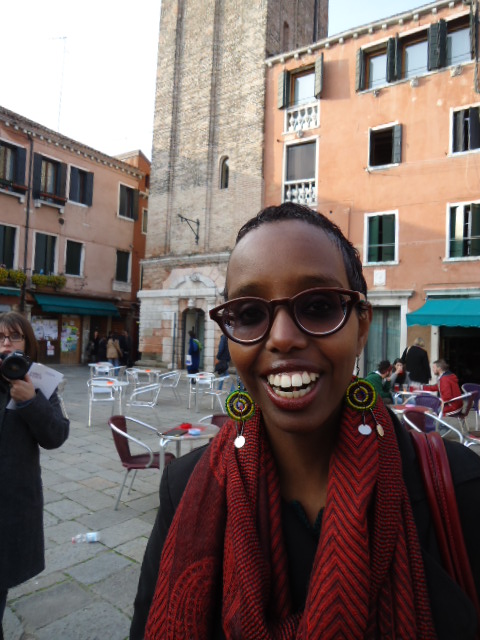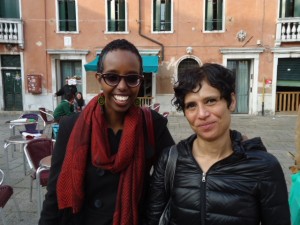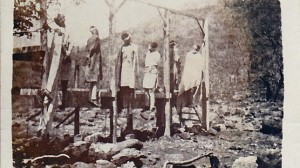Igiaba Scego’s story Salsiccia (‘Sausage’) won Italy’s Eks&Tra prize in 2003 and her novel La mia casa è dove sono (‘My home is where I am’) won the prestigious Mondello prize in 2011.
Igiaba’s novel La nomade che amava Hitchcock (‘The Nomad who Loved Hitchcock’) was published in 2003 – sadly none of her novels have been translated into English, even though there is already a dissertation in English on her work.
Igiaba is a graduate of the University of Rome, La Sapienza, and is currently working on a doctorate in education. She describes herself as ‘Somali by origin; Italian by vocation’.
This is a picture of Igiaba with Gabriella Kuruvilla, author of the novel Milano, fin qui tutto bene (‘Milan, So Far So Good’). Gabriella’s father is from Kerala and her mother is Italian. She grew up in Italy and is a journalist by profession. Unfortunately her book has not been translated either – I am sure it would find many readers in India, in Malayalam as well as English.
Like many in Italy Igiaba is deeply concerned about recent attempts to rehabilitate Fascism in public memory. This is how James Walston, a professor in the American University in Rome describes the current situation, in a recent article:
Like the odour of a stale changing room, the smell of fascism keeps on reappearing… Last week, a Rome high school teacher admonished a Jewish student telling her “in Auschwitz, you’d have been more diligent” when the girl left class because she was feeling sick. When the class accused the teacher of being racist, she made things worse, “I’m not racist – I just meant a place that was well-organised”… eh? To make matters even worse, the headmistress said “the teacher didn’t mean what she said and… she didn’t want to offend anyone and so she wasn’t reprimanded.
On Thursday, the mayor of Rome, Gianni Alemanno organised a demonstration in front of the Coliseum in favour of the Italian marines accused of killing two Indian fishermen. For a start, he ignored an order from the Superintendent of Fine Arts not to put up a stand (authoritarian if not fascist) and then, alongside the San Marco Brigade pennant (the marines) and the city flag was a banner of the Decima MAS, the brutal special forces which worked alongside the SS in Mussolini’s puppet republic between 1943 and and 1945 murdering partisans and civilians.
Recently the mayor of a village called Affile, near Rome, which is known, as this New York Times article puts it ‘for its fresh air, olive oil and wine — and its residual appreciation of Benito Mussolini‘ unveiled a memorial to Rodolfo Graziani, one of Mussolini’s generals, who was responsible for ‘killing hundreds of thousands of people — sometimes with chemical weapons — and wiping out entire communities, especially in Eritrea.’
There were many protests, including this demonstration by the Ethiopian community in Washington D.C.. There was even a demonstration in Affile, which is heartening.
Igiaba was moved to write this petition to the President of the region of Lazio:
Dear President Nicola Zingaretti,
My name is Igiaba Scego, I am a writer, born in Italy, daughter of Somali people.
I am one of the so-called “second generation”. A woman who proudly feel herself both Somali, Italian, Roman.
I am writing to you because on the 11th of August 2012, in Affile, a small town in the province of Rome, it was inaugurated a monument in honour of the fascist Rodolfo Graziani. The monument was built with a loan of 130 thousand euro from the Lazio region, a fund originally intended to finance the Radimonte park.
Rodolfo Graziani, as you know, was one of the most ferocious commander that fascism has ever had. He was found guilty of war crimes in Cyrenaica and Ethiopia; the massacre of deacons in Debra Libanos and the use of prohibited gas during the colonial war of ’36 are just two of those massacres that can be mentioned.
After the end of World War II, the emperor of Ethiopia, Haile Selassie, firmly asked for Rodolfo Graziani to be included in the list of war criminals. The Commission of the United Nations War Crimes placed him at the first place in that list.
The monument to Rodolfo Graziani is therefore a tragic paradox, a stain on our democracy, an insult to our constitution born from the struggle against fascism.
In the recent days, the neoparlamentari Kyenge, Ghizzoni and Beni filed an interpellation to address this problem to the Government.
I am somehow trying to be with them, by asking to you, Mr President Zingaretti, a real commitment against this monument of shame. I am not only asking for words but for a real commitment (demolition and / or conversion of the monument) that can let the sun of democracy to shine again in Italy, approaching the 68th anniversary of the April 25.
My grandfather had to translate Graziani’s crimes, he was a colonial victim, and had to translate the horror, against his will. Today in 2013, his niece, has another destiny. For me and for all I am asking to you a serious commitment on this crucial issue of democracy.
The petition can be signed here.




The origins of the word “fascist” is from “fasce”, bundle of sticks bound together, it means that “unity is stronger than individuals alone”. The “fasce” were first used as national symbols during Napoleon’s attack and “liberation” of Italy at the end of eigteenth century. Mussolini had cleverly taken those symbols of national pride to turn them into his instrument of propoganda.
Given the impact of continuing economic crisis and how such moments can be used to whip passions against all the different groups such as emigrants, gays, etc. to say that these are the real problems .. unfortunately, I feel that return of fascism and other nationalist groups can only get worse in coming years.
That is a disturbing thought!
best
Amitav